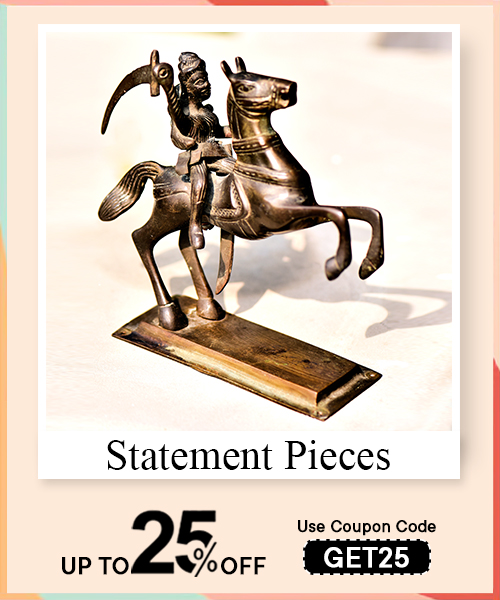- Knobs & Handles
- Hooks & Hangers
- Statement Pieces
- Metal Door knockers
- Venetian Mirror
- Silver Jewellery
- Bathroom Hardware
- Coaster
- Wall Art
- Wooden Printing Blocks
- Lamps
- Christmas Ornaments
- Meditation Bowls
- Copper Utensils
- Wall Bracket
- Kitchenware
- Vintage Pocket Watch
- Spice Boxes
- Old Ceramics
- Door Stopper
- Furniture
- Glass Bottle
- Home Furnishing
- Beads
- Swing Chains
- Hand-Made Stationery
- Clothing, Shoes & Jewelry
- Gifts And Offers
- Discounted Products
- Gold Jewellery
- Tea
- ← Door Handles
- All Door Handles
- Almirah Handles
- Bone Bridge Handles
- Brass Door Handles
- Brass Mortice Handles
- Ceramic Bridge Handles
- Ceramic handles
- Cupboard Door Handles
- Glass Bridge Handles
- Glass handles
- Kitchen Door Handles
- Metal handles
- Mortice Ceramic Door Handles
- Stone Bridge Handles
- Stone Handles
- Wooden, bone, resin & horn Handles
- ← Bronze Statement Pieces
- All Bronze Statement Pieces
- Bronze Animals
- Bronze Buddha
- Bronze Chariot
- Bronze english statues
- Bronze Ganesha
- Bronze god statues
- Bronze Kali Statue
- Bronze Krishna & Vishnuji
- Bronze Laxmi & Parvati
- Bronze Nandi
- Bronze Natraj
- Bronze Ram & Hanuman
- Bronze Shiva
- Bronze Surma Dani
- Bronze Temple
- Buddha Statue
- Dog Chains
- Flower Pots
- Incense Holder
- Other Metal Figurines
- Saraswati Statue Murti
- Vintage Foot Scrubber
- Vintage Hookah Base
- Yoni
- ← Ceramic knobs
- All Ceramic knobs
- Ceramic A-Z Knobs
- Ceramic bulb shape knob
- Ceramic crackle knob
- Ceramic dotted knob
- Ceramic fauna knobs
- Ceramic floral pattern knobs
- Ceramic flower shape knob
- Ceramic Heart Knobs
- Ceramic kids room knob
- Ceramic Numerical Knobs
- Ceramic solid color knob
- Ceramic Strewn Knobs
- Ceramic striped knob
- Ceramic vehicular Knobs
- Ceramic Vintage Style Knobs
- Clock face ceramic knob
- Theia Ceramic Knobs and Handles
- ← Ceramic Wall Hooks
- All Ceramic Wall Hooks
- Alphabet Hooks
- Ceramic Bulb Shape Hooks
- Ceramic Crackle Wall Hooks
- Ceramic Dotted Wall Hooks
- Ceramic Etched Hooks
- Ceramic Iron Hooks
- Ceramic Solid Color Wall Hooks
- Ceramic Star Shape Hooks
- Ceramic Strewn Wall Hooks
- Ceramic Striped Wall Hooks
- Ceramic Tile Hooks
- Ceramic Zinc Hooks
- Fauna Hooks
- Floral Painted Hooks
- Flower Shape Hook
- Fruits hooks
- Numerical Hooks
- Vehicular Hooks
- ← Vintage Indian Kitchen
- All Vintage Indian Kitchen
- Appe Moulds
- Bronze Mortar and Pestle
- Clay Cookware
- Milk Container
- Vintage Bowl
- Vintage brass cups
- Vintage Cooking Pot
- Vintage Grater
- Vintage Jug
- Vintage Lunch Boxes
- Vintage Metal Plates and Trays
- Vintage Nut Crackers
- Vintage pots for washing hands
- Vintage Samovar
- Vintage Spoons
- Vintage Tea Pot
- Vintage Water Pots
- ← Hooks & Hangers
- All Hooks & Hangers
- Adhesive Hooks
- Aluminium Hooks
- Animal Shape Hooks
- Brass Wall Hooks
- Bronze Tribal Hooks & Hangers
- Ceramic Wall Hooks
- Cloth Hanger
- Glass Wall Hooks
- Hat & Coat Hook
- Iron Hooks
- Key Holders
- Kids Wall Hooks
- Towel Hanger
- Wall & Wood Hooks
- Wall Hangers
- Wall Hanging
- Wall Hooks
- Wood Wall Hangers
- Wooden block hooks
- ← Glass Knobs
- All Glass Knobs
- Berry Glass knob
- Big Glass Knob
- Crystal knob
- Fine cut glass knobs
- Flat Glass Knobs
- Flower inside glass knob
- Glass bubble knob
- Glass devils eye knob
- Glass diamond shape knob
- Glass Dotted knob
- Glass flower knob
- Glass Heart Knobs
- Glass Mushroom Knob
- Glass square knob
- Glass Star Flower Knob
- Glass striped knob
- Glass Tube Knob
- Glass Wheel knob
- Mercury Glass Knobs
- Spiral inside glass knob
- Tingle glass knobs
- Tiny cyclone glass knobs
- Tiny glass ball knob
- Umbrella glass knob
- ← Statement Pieces
- All Statement Pieces
- Bandhanwaar
- Bastar Art
- Bottle Opener
- Brass Table Legs
- Bronze Oil Lamps
- Bronze Statement Pieces
- Clocks
- Cloisonne
- Glass Oil Lamps
- Indian Calendar
- Key Chain
- Metal Back Scratchers
- old wooden juicer
- Pottery
- Puppet
- Tibetan Gong
- Urli
- Urli, Pots & Planters
- Vases and Pen Stands
- Vintage bells
- Vintage Door Lock
- Vintage Indian Kitchen
- Vintage Iron
- Vintage Jewelry Boxes
- Water Fountain
- Wooden Statement Pieces
- Tray & Coasters
- ← Wall Art
- All Wall Art
- Abstract Art Paintings
- Canvas Painting
- Canvas Rajasthani Painting
- Charcoal Drawing
- Contemporary
- Film Posters
- Islamic Calligraphy Wall Art
- Landscape Paintings
- Metal Wall Art
- Miniature Paintings
- Mughal Art
- Needle Painting
- Oil Paintings
- Pichwai Paintings
- Portrait Paintings
- Prints and Lithographs
- Radha Krishna Paintings
- Sketch Paintings
- Tanjore Art
- Thangka Paintings
- Vintage Photos
- ← Spice Boxes
- All Spice Boxes
- Chest Of Drawers
- Eight Drawers Spice Box
- Five Drawers Spice Box
- Four Drawer Spice Box
- Nine Drawers Spice Box
- Old Spice Boxes
- One Drawers Spice Box
- Seven Drawers Spice Box
- Six Drawers Spice Box
- Sixteen Drawers Spice Box
- Ten Drawers Spice Box
- Three Drawers Spice Box
- Twelve Drawers Spice Box
- Two Drawers Spice Box

Cash on Delivery
Easy Returns and 100% Purchase Protection

Get upto 15% off
On Prepaid Orders

Free Shipping
On Orders above Rs. 500
-

-
Customer Support: +91-9999072207
Mon-Sat (10 AM - 6 PM)

Cash on Delivery
Easy Returns and 100% Purchase Protection

Get upto 15% off
On Prepaid Orders

Free Shipping
On Orders above Rs. 500








